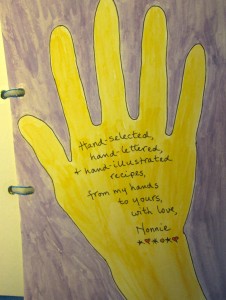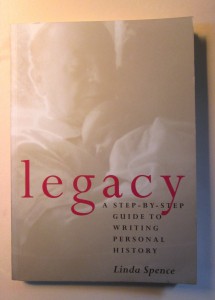You might say I’ve been a bit obsessed by the concept of legacy lately, especially since I’ve been working on the legacy cookbook for my two grandchildren, Lauren and Thomas (see “Legacy” post of 6/21/14). That project is almost completed – all that remains is the binding for my grandson’s (in deerskin) – but the larger idea of legacy, what we leave behind, continues to fascinate and intrigue me.

In my research, I stumbled upon a lovely book worth pressing on others who may share my interest in the topic but wonder, “Where do I begin?” Written and compiled by Linda Spence and published by Ohio University Press, the book, Legacy: A Step-by-Step Guide to Writing Personal History, is animated by the belief that every life has value and knowledge for others.
“What goes into living a life during your time, in your particular place?” writes Spence. “This is what our children want to know. This is what we share with our dearest friends. It’s an affirmation of the familiar phrase, ‘We’re all in this together,’ something we seem to sense when we’re very young, yet understand more deeply as we have time to reflect on our lives. Take the time. Tell us. Acknowledge the together of today and tomorrow, by giving your stories. The story of a life is a priceless legacy.”
Spence’s book is not in itself a workbook; rather, it is designed to be used with a blank writing book. It follows life’s major stages and is filled with evocative photos, questions, and prompts.
Spence writes: “This is a book waiting to become your story. Parts of your life may already be known to others, but don’t assume that what seems obvious to you will be familiar to them; and here, too, are questions that may not yet have been asked. If no one has asked, someone someday will, and this written record could be their only chance to get your answers. In Legacy you are invited to share your experiences, insights, and the wisdom and humility of your years.”
In my experience as a creative nonfiction writing instructor, I’ve observed that older people with a talent for the written word and an inclination to write those words down are often drawn to the memoir form. As we approach our later years, we seem driven to make sense of our lives in writing and to share our worthwhile written stories with others. Some, like my student Grace Fichtelberg (see 5/6/14 post), write their memoirs for their families’ enjoyment alone; others, like Stephanie Sydoriak (see 8/1/14 post) and Heidi Smith (see 9/16/14 post), ultimately publish theirs in book form for a larger audience.
Legacy presumes no writing experience or author-aspirations. It is simply a good place to start sharing your life’s stories, in an informal, unintimidating way. Your children and grandchildren may thank you for it.
# # #
Post Script: I recently came across a short video worth watching about a remarkable woman named Maggie Thompson who wrote and published her memoirs at the age of 91. Her book, which I have yet to read, is called From One to Ninety-One. Watch her video at www.YouTube.com/Maggie INK. I’m sure you’ll enjoy it too.

